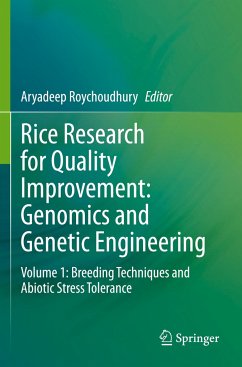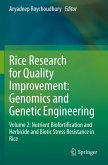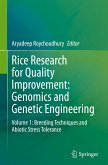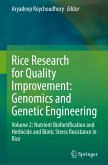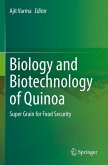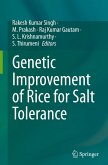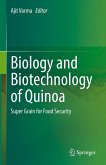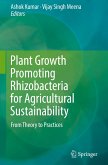Rice Research for Quality Improvement: Genomics and Genetic Engineering
Volume 1: Breeding Techniques and Abiotic Stress Tolerance
Herausgegeben:Roychoudhury, Aryadeep
Rice Research for Quality Improvement: Genomics and Genetic Engineering
Volume 1: Breeding Techniques and Abiotic Stress Tolerance
Herausgegeben:Roychoudhury, Aryadeep
- Broschiertes Buch
- Merkliste
- Auf die Merkliste
- Bewerten Bewerten
- Teilen
- Produkt teilen
- Produkterinnerung
- Produkterinnerung
This book focuses on the conventional breeding approach, and on the latest high-throughput genomics tools and genetic engineering / biotechnological interventions used to improve rice quality. It is the first book to exclusively focus on rice as a major food crop and the application of genomics and genetic engineering approaches to achieve enhanced rice quality in terms of tolerance to various abiotic stresses, resistance to biotic stresses, herbicide resistance, nutritional value, photosynthetic performance, nitrogen use efficiency, and grain yield. The range of topics is quite broad and…mehr
Andere Kunden interessierten sich auch für
![Rice Research for Quality Improvement: Genomics and Genetic Engineering Rice Research for Quality Improvement: Genomics and Genetic Engineering]() Rice Research for Quality Improvement: Genomics and Genetic Engineering223,99 €
Rice Research for Quality Improvement: Genomics and Genetic Engineering223,99 €![Rice Research for Quality Improvement: Genomics and Genetic Engineering Rice Research for Quality Improvement: Genomics and Genetic Engineering]() Rice Research for Quality Improvement: Genomics and Genetic Engineering172,99 €
Rice Research for Quality Improvement: Genomics and Genetic Engineering172,99 €![Rice Research for Quality Improvement: Genomics and Genetic Engineering Rice Research for Quality Improvement: Genomics and Genetic Engineering]() Rice Research for Quality Improvement: Genomics and Genetic Engineering224,99 €
Rice Research for Quality Improvement: Genomics and Genetic Engineering224,99 €![Biology and Biotechnology of Quinoa Biology and Biotechnology of Quinoa]() Biology and Biotechnology of Quinoa127,99 €
Biology and Biotechnology of Quinoa127,99 €![Genetic Improvement of Rice for Salt Tolerance Genetic Improvement of Rice for Salt Tolerance]() Genetic Improvement of Rice for Salt Tolerance119,99 €
Genetic Improvement of Rice for Salt Tolerance119,99 €![Biology and Biotechnology of Quinoa Biology and Biotechnology of Quinoa]() Biology and Biotechnology of Quinoa127,99 €
Biology and Biotechnology of Quinoa127,99 €![Plant Growth Promoting Rhizobacteria for Agricultural Sustainability Plant Growth Promoting Rhizobacteria for Agricultural Sustainability]() Plant Growth Promoting Rhizobacteria for Agricultural Sustainability112,99 €
Plant Growth Promoting Rhizobacteria for Agricultural Sustainability112,99 €-
-
-
This book focuses on the conventional breeding approach, and on the latest high-throughput genomics tools and genetic engineering / biotechnological interventions used to improve rice quality. It is the first book to exclusively focus on rice as a major food crop and the application of genomics and genetic engineering approaches to achieve enhanced rice quality in terms of tolerance to various abiotic stresses, resistance to biotic stresses, herbicide resistance, nutritional value, photosynthetic performance, nitrogen use efficiency, and grain yield. The range of topics is quite broad and exhaustive, making the book an essential reference guide for researchers and scientists around the globe who are working in the field of rice genomics and biotechnology. In addition, it provides a road map for rice quality improvement that plant breeders and agriculturists can actively consult to achieve better crop production.
Produktdetails
- Produktdetails
- Verlag: Springer / Springer Nature Singapore / Springer, Berlin
- Artikelnr. des Verlages: 978-981-15-4122-3
- 1st edition 2020
- Seitenzahl: 796
- Erscheinungstermin: 2. November 2021
- Englisch
- Abmessung: 235mm x 155mm x 43mm
- Gewicht: 1183g
- ISBN-13: 9789811541223
- ISBN-10: 9811541221
- Artikelnr.: 62676098
- Herstellerkennzeichnung Die Herstellerinformationen sind derzeit nicht verfügbar.
- Verlag: Springer / Springer Nature Singapore / Springer, Berlin
- Artikelnr. des Verlages: 978-981-15-4122-3
- 1st edition 2020
- Seitenzahl: 796
- Erscheinungstermin: 2. November 2021
- Englisch
- Abmessung: 235mm x 155mm x 43mm
- Gewicht: 1183g
- ISBN-13: 9789811541223
- ISBN-10: 9811541221
- Artikelnr.: 62676098
- Herstellerkennzeichnung Die Herstellerinformationen sind derzeit nicht verfügbar.
Aryadeep Roychoudhury is working as Assistant Professor at the Department of Biotechnology, St. Xavier's College (Autonomous), Kolkata, West Bengal, India. He received his B.Sc. (Hons.) in Botany from Presidency College, Kolkata, and M.Sc. in Biophysics and Molecular Biology, University of Calcutta, West Bengal, India. He did his Ph.D. from Bose Institute, Kolkata, under Jadavpur University, Kolkata. His Ph.D. thesis was mostly based on characterization of different salt-inducible genes in rice. Following his Ph.D. work, he joined as Research Associate (Postdoctorate) at the University of Calcutta, continuing with rice as model system. Dr. Roychoudhury is currently handling several government-funded projects on abiotic stress responses in rice and supervising five (05) Ph.D. students as Principal Investigator. To date, he has published over 110 articles in peer-reviewed journals and chapters in books of international and national repute. He is a regular reviewer of articles in high-impact, international journals, life member of different scientific associations and societies, and the recipient of the Young Scientist Award 2019, conferred upon him by International Foundation for Environment and Ecology, at the University of Allahabad, Prayagraj, Uttar Pradesh.
Chapter 1. Origin and Evolution of Rice as Domesticated Food Crop.- Chapter 2. Major constraints for global rice production: Changing climate, abiotic and biotic stresses.- Chapter 3. Germplasm and genetic diversity studies in rice for stress response and quality traits.- Chapter 4. Potentiality of wild rice in quality improvement of cultivated rice varieties.- Chapter 5. Improvement of Rice Quality: The New Revolution.- Chapter 6. Sequencing the Rice Genome: Gateway to Agricultural Development.- Chapter 7. Genomics approaches to understand varietal differences in rice species and genotypes with respect to stress response and quality traits.- Chapter 8. Selection and hybridization techniques for stress management and quality improvement in rice.- Chapter 9. Transformation techniques and molecular analysis of transgenic rice.- Chapter 10. New approaches for improving salt stress tolerance in rice.- Chapter 11. Genomics and biotechnological approaches in generating salinity and drought tolerance in rice.- Chapter 12. An integrated approach for drought tolerance improvement in rice.- Chapter 13. Genomics and genetic engineering to develop metal/metalloid stress tolerant rice.- Chapter 14. Potential biotechnological strategies to improve quality and productivity of rice under arsenic stress.- Chapter 15. Genetic engineering: A powerful tool to abrogate the effect of metal/metalloid toxicity in rice.- Chapter 16. Genomics and genetic engineering of rice for tolerance to ozone and anoxia.- Chapter 17. Physiological and genetic basis of submergence tolerance in rice.- Chapter 18. Transgenic rice for survival in nutrient-deficient soil.- Chapter 19. Genetic engineering in rice to survive in nutrient-deficient soil.- Chapter 20. Developing C4 rice for higher photosynthetic efficiency and environmental stress tolerance.- Chapter 21. Rice tolerance to high light intensity andUV radiation: Genomics, breeding and genetic engineering.- Chapter 22. Improving rice tolerance to low and high temperature stress through biotechnological approaches.- Chapter 23. Biotechnological approaches to develop rice tolerance to low and high temperature stress.- Chapter 24. Influence of night temperature on rice yield and quality.- Chapter 25. Rice tolerance to multiple abiotic stress: Genomics and genetic engineering.- Chapter 26. Targeting metabolic pathways for genetic engineering abiotic stress tolerance in rice.- Chapter 27. Targeting phytohormone levels for genetic engineering abiotic stress tolerance in rice.- Chapter 28. The effect of exposure to a combination of stressors on rice productivity and grain yields.- Chapter 29. Rice Grain Quality Traits: Neglected or Less Addressed?.- Chapter 30. Rice grain quality and abiotic stress: Genomics and biotechnological perspectives.- Chapter 31. Increasing rice grain yieldunder abiotic stresses: mutagenesis, genomics and transgenic approaches.-
Chapter 1. Origin and Evolution of Rice as Domesticated Food Crop.- Chapter 2. Major constraints for global rice production: Changing climate, abiotic and biotic stresses.- Chapter 3. Germplasm and genetic diversity studies in rice for stress response and quality traits.- Chapter 4. Potentiality of wild rice in quality improvement of cultivated rice varieties.- Chapter 5. Improvement of Rice Quality: The New Revolution.- Chapter 6. Sequencing the Rice Genome: Gateway to Agricultural Development.- Chapter 7. Genomics approaches to understand varietal differences in rice species and genotypes with respect to stress response and quality traits.- Chapter 8. Selection and hybridization techniques for stress management and quality improvement in rice.- Chapter 9. Transformation techniques and molecular analysis of transgenic rice.- Chapter 10. New approaches for improving salt stress tolerance in rice.- Chapter 11. Genomics and biotechnological approaches in generating salinity and drought tolerance in rice.- Chapter 12. An integrated approach for drought tolerance improvement in rice.- Chapter 13. Genomics and genetic engineering to develop metal/metalloid stress tolerant rice.- Chapter 14. Potential biotechnological strategies to improve quality and productivity of rice under arsenic stress.- Chapter 15. Genetic engineering: A powerful tool to abrogate the effect of metal/metalloid toxicity in rice.- Chapter 16. Genomics and genetic engineering of rice for tolerance to ozone and anoxia.- Chapter 17. Physiological and genetic basis of submergence tolerance in rice.- Chapter 18. Transgenic rice for survival in nutrient-deficient soil.- Chapter 19. Genetic engineering in rice to survive in nutrient-deficient soil.- Chapter 20. Developing C4 rice for higher photosynthetic efficiency and environmental stress tolerance.- Chapter 21. Rice tolerance to high light intensity andUV radiation: Genomics, breeding and genetic engineering.- Chapter 22. Improving rice tolerance to low and high temperature stress through biotechnological approaches.- Chapter 23. Biotechnological approaches to develop rice tolerance to low and high temperature stress.- Chapter 24. Influence of night temperature on rice yield and quality.- Chapter 25. Rice tolerance to multiple abiotic stress: Genomics and genetic engineering.- Chapter 26. Targeting metabolic pathways for genetic engineering abiotic stress tolerance in rice.- Chapter 27. Targeting phytohormone levels for genetic engineering abiotic stress tolerance in rice.- Chapter 28. The effect of exposure to a combination of stressors on rice productivity and grain yields.- Chapter 29. Rice Grain Quality Traits: Neglected or Less Addressed?.- Chapter 30. Rice grain quality and abiotic stress: Genomics and biotechnological perspectives.- Chapter 31. Increasing rice grain yieldunder abiotic stresses: mutagenesis, genomics and transgenic approaches.-

